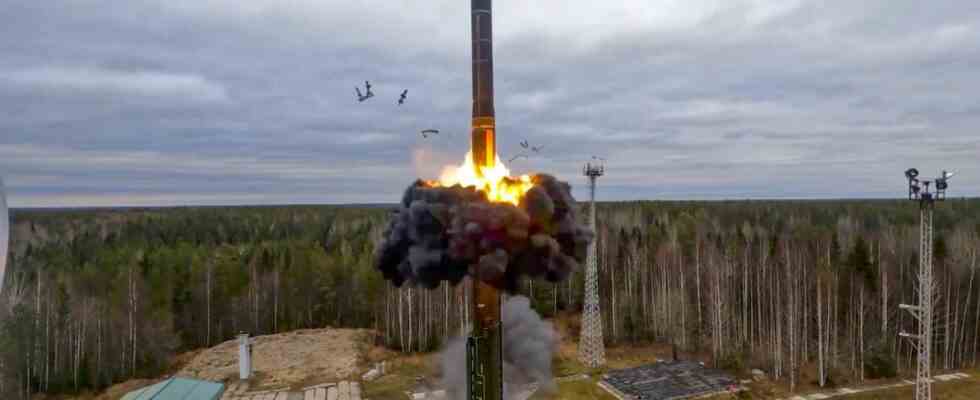After his return from China, Chancellor Olaf Scholz was visibly proud. During his visit to Beijing, party leader Xi Jinping made it clear: “The use of nuclear weapons or the threat to do so must be rejected.” The international community should work to ensure “that nuclear weapons cannot be used and that nuclear wars cannot be fought.”
A great diplomatic victory, that’s how Scholz understood the statements of his counterpart. “The whole trip was worth it for that alone,” said the Chancellor in Berlin on Saturday. In the run-up to his short trip, he had been widely criticized. Did Scholz achieve a rethink in China during his trip, during which he only spent eleven hours in Beijing? Or even pushed Xi into making a promise that the Chinese president didn’t want to make in this way?
China is considered Russia’s most powerful ally. Since the Russian invasion of Ukraine, China has maintained its partnership with Moscow. Although Beijing officially declares neutrality, at home it blames the United States and NATO for the conflict. While murders are taking place in Ukraine, China’s state press is talking about “friendship without borders”.
A red line for Beijing
One thing is certain: for Putin, supporting China under the pressure of Western sanctions is more important than ever. While the Western countries slowly detach themselves from Russian energy imports, Russia is dependent on selling its raw materials to China. Beijing supplies industrial goods that Russia can no longer get from democratic countries. Should Russia prepare to use nuclear weapons, an imminent ban by the Chinese party leader could have a deterrent effect on Putin.
First, there is no guarantee that Beijing’s influence will actually be sufficient to sway Russia’s actions should the Kremlin opt for nuclear escalation, according to China expert Jude Blanchette of the Center for Strategic and International Studies. In addition, Xi’s statement is not a course correction. “The statement from the Chinese side is overall something positive,” says Jonas Schneider from the German Institute for International and Security Affairs (SWP) in Berlin. However, experts basically assumed that the Chinese government would reject a possible Russian use of nuclear weapons in Ukraine. In October, Chinese diplomats had already leaked to their colleagues in Brussels that an operation was completely unacceptable.
According to the Merics Institute, former high-ranking military officers had recently signaled that the use of tactical nuclear weapons would set a red line for Beijing. The representation that Scholz had influenced Xi Jinping is therefore highly questionable.
The Chinese president needs trade ties with Europe and the US more than with his Russian neighbor. It is also clear that the longer the war lasts, the more difficult it will be for Beijing to keep up the balancing act between Russia and the West. At the same time, Xi Jinping does not mention Russia in his statement against the use of nuclear weapons, nor does he name Ukraine as a country. He only speaks of the “Ukraine crisis”, appeals to the “international community” and declares that a nuclear war in “Eurasia” should be prevented.
Putin’s threatening gestures, Beijing’s vague statements
For Scholz, the statement was important to justify the visit to his critics at home. The statement also helps Beijing with its staging in this military conflict. The country presents itself as a peacemaker, even if China has not yet condemned the Russian attack. In view of Putin’s nuclear threats, China’s statement was relatively vague and should hardly have offended the Russian ruler. SWP expert Schneider calls it “skillful diplomacy”.
What Scholz also does not mention: Beijing itself is likely to be facing the largest expansion of its nuclear weapons program in history. According to estimates by independent experts from the Federation of American Scientists, a non-profit think tank, the country only had around 200 warheads in 2008. Today it has almost 350. Beijing is the world’s third largest nuclear weapon behind Russia and the USA. And that is just the beginning.
In 2021, US researchers discovered around 300 silos under construction in the provinces of Gansu and Xinjiang, apparently for ICBMs. It currently has 20 such facilities. According to a November 2021 report by the US Department of Defense, China could have more than 1,000 nuclear warheads by 2030. “We will build a strong system of strategic deterrence,” Xi announced at the party congress two weeks ago.
In recent years, China has also expanded its nuclear delivery system choices, now possessing road-mobile intercontinental-range missiles, intermediate-range missiles, and developing air-launched ballistic missiles. China has been committed to the Non-Proliferation Treaty since 1992, which aims to end the proliferation of nuclear weapons and promote disarmament. However, according to a SWP analysis, China’s nuclear build-up is likely to accelerate.
The Ukraine War as a Case Study
According to SWP expert Schneider, China has no interest in nuclear weapons being used again after 77 years. Hardly any other country has benefited as much from globalization and the stability of the international order as China in recent years.
But there is also another reason. Although the country has upgraded, its nuclear arsenal is still significantly smaller than that of the United States. Should there be a conflict in which the use of nuclear weapons would be tolerated, China would be disadvantaged.
For China, the Ukraine war is also a kind of case study. If Putin’s nuclear threats are sufficient to deter or slow down Western interventions, Beijing is likely to draw the appropriate conclusions for its dispute with Taiwan. China threatens to take democracy off its coast by force if Taiwanese don’t agree to peaceful “reunification.” “There is a danger that China will learn what we believe to be the wrong lesson,” says Schneider.
Although China has officially declared that it will not use nuclear weapons for the first time, according to the Chinese interpretation, the country may threaten to use them.

